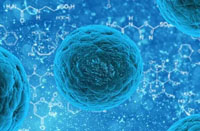Chemo on the Brain
By Kelli Whitlock Burton
ScienceNOW Daily News
30 November 2006

Brain drain.
A brain MRI of a 5-year-old who suffered severe cognitive decline following chemotherapy. The white matter, which is responsible for brain communication, appears mottled.
Credit: Patricia Duffner
Three widely used chemotherapy drugs can cause permanent damage to healthy brain cells, a new animal study suggests. The work could explain a range of cognitive problems collectively called "chemobrain," which may leave as many as 80% of all cancer patients with memory loss, confusion, and an inability to concentrate. "This offers a physiological basis to something that some of us have been concerned about for a long time," says Patricia Duffner, a pediatric oncologist at the University of Buffalo School of Medicine in New York who was not affiliated with the study.
Scientists at the University of Rochester in New York examined the neural impact of three chemotherapeutic drugs: cisplatin, often used to treat breast, lung, and colon cancer; carmustine, used to treat brain tumors; and cytarabine, a treatment for leukemia and some lymphomas. The drugs caused widespread brain cell death in human cancer cell cultures and in live mice, even when administered at low levels, the researchers found. In cell cultures, the dosage needed to kill 40% to 80% of the cancer cells also killed 70% to 100% of healthy brain cells, the team reports in the today's issue of the Journal of Biology. And in live animals that received chemotherapy in doses that mimic those used in people, the numbers of dividing cells continued to drop for weeks after chemotherapy stopped. Particularly vulnerable were neurons in the hippocampus, an important memory center, and oligodendrocytes梒ells that make a compound called myelin, which insulates neurons to allow electrical impulses to travel quickly across the brain.
"The whole nervous system is organized on being able to send information very quickly along pathways that are extensively myelinated," says Mark Noble, a stem cell biologist and lead researcher on the study. When chemotherapy damages cells responsible for making myelin, that information flow is disrupted.
A particularly surprising find was the drugs' killing effect on mature, nondividing cells, which contradicts the long-held belief that chemotherapy targeted only rapidly dividing cells, says Noble. "This is not a message to avoid chemotherapy," he says, but patients should know that the drugs could have an impact on their long-term quality of life. "We are working to find ways to prevent and reduce the damage without compromising cancer therapy."









